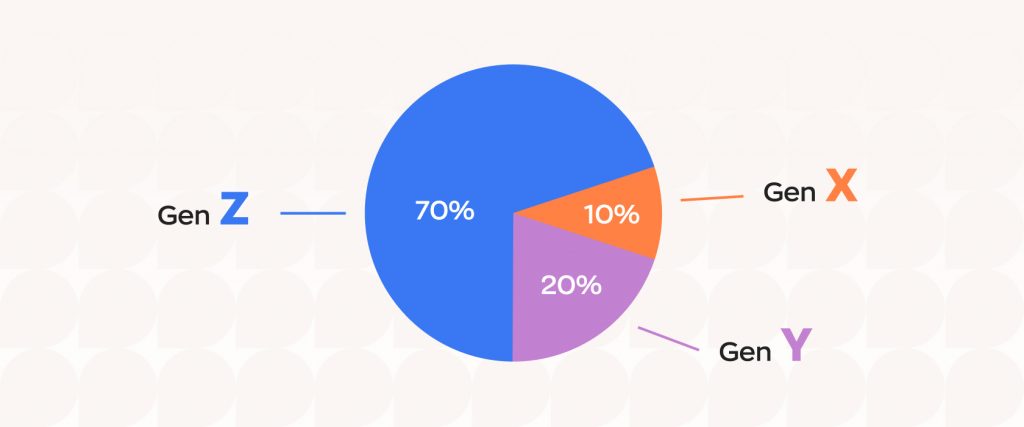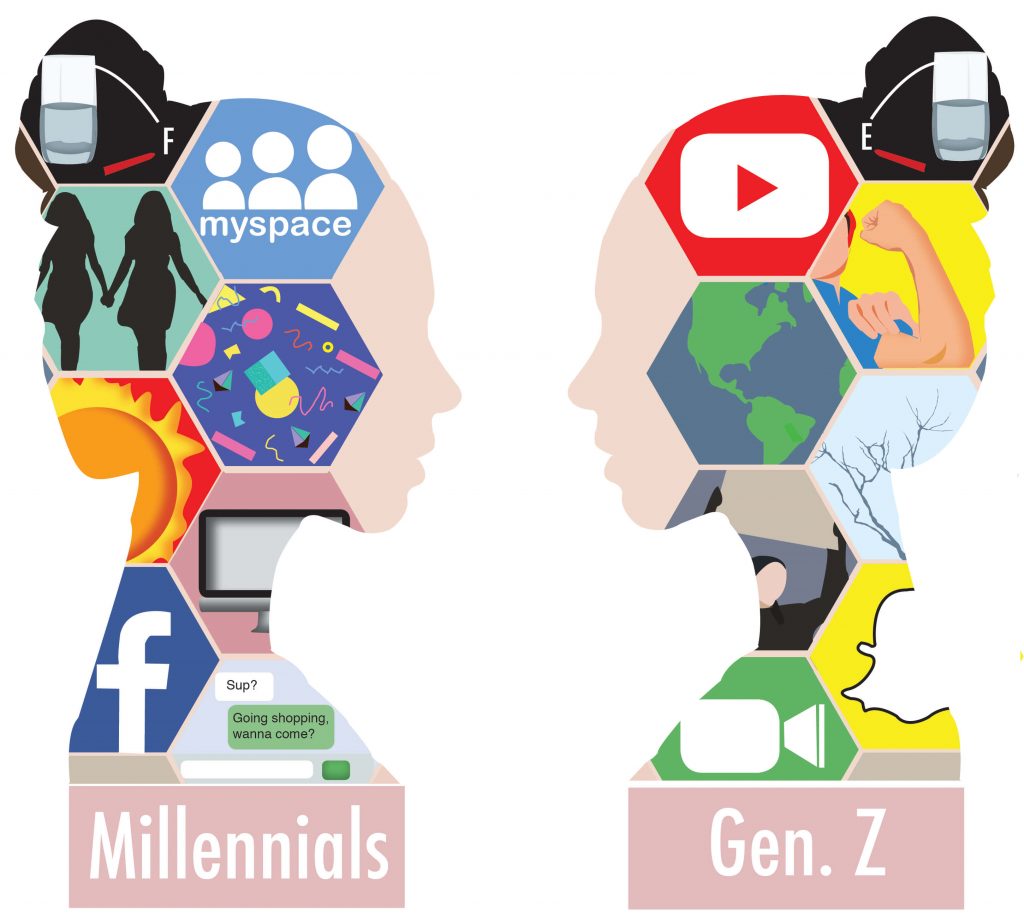Recruitment vs. Gen Z
There are over 1.9 billion Gen Z’s in the world, they make up almost a quarter of the world’s population, and the oldest are over the age of 26. Professionals born between 1995 and 2010 are by far the most popular request for recruiters. Among them, you can find both entry-level professionals and people in leadership positions.
For example, at Talentgrator, Gen Z makes up a large part of the team:

The Talentgrator team’s generational ratio
The generation that prefers to ‘Google’ rather than memorize is the most progressive, knowledgeable, and versatile. Over the last 20 years, they have created so many new professions, the essence of which can hardly be understood by members of the older generations: bloggers, tick-tockers, SMM managers, stories managers, developers working in unique programming languages, personal growth trainers, and many more examples.
There are often people among centenarians who are fluent in 2-3 languages.

Source: The Times-Delphic
The iGen generation is also renowned for its conscious approach to its own life. They do not work in the same position and for the same company for 10 years to gain seniority, do not tolerate unacceptable working conditions, and move quickly from one position to another. Members of this generation do not believe they need decades of experience to be in demand and choose to show their worth through strong ideas, initiative, and an open mind.
Unlike millennials, they care more about the environment, strive to reduce consumption, and create hundreds of projects every day that contain benefits and have a social mission.
“In working with professionals aged 21-24, I like the general vibe and approach to work a lot. “Chill-chill, I’ll get it done today” is the phrase I hear most often from my colleague the moment my nervous system leaves the chat room. And that’s cool. Very sobering and a reminder that no one is going to die from sending out material 20 minutes before the deadline.”
Valeria Rubets, Marketing Manager, Talentgrator
Generation Z is significantly more likely to have an entrepreneurial streak and the need for continuous growth, even while staying within the same company. They genuinely love to learn, and when choosing a new job, they always look at what they can learn and how quickly they can implement it in their work.
What your future employees can learn is worth stating immediately in the job description and communicating at the start of your communication.
A coaching approach with iGen will make cooperation much more effective than a conservative and stereotypical management process.
What specifics do recruiters and HR managers need to consider when dealing with Z teams?
- You should never call a candidate without first agreeing to a call. You are likely to encounter a wary tone if you get an answer at all :).
- The company name and image are no longer as important as they used to be. Such a candidate, first and foremost, looks at the healthy atmosphere within, as well as the internal and external environmental friendliness of the company.
- Education. This point might not be on the CV at all, not to be surprised, but upon further investigation, it might be revealed that there is a vast pool of knowledge obtained outside the scope of a classical university.
- Development. Speak about horizontal/vertical growth in the company in the first place and the image and scale of the company in the last.
- Individual approach. This is not just another advertising slogan, but a format of work that the younger generation needs.
- Z-ets are very appreciative of their time and work, so they break new financial barriers. They are not prepared to settle for little and will not work “for an idea.”
- Sustainable is one word we could use to describe Generation Z. For them, sustainability is important in consumption and communication, work, and all other aspects of life.
What is the right way to recruit this generation?
“First of all, these professionals pay attention to the recruiter’s communication, then monitor everything about the company (reviews, employee pages, etc.). It’s not as important the salary as the environmental friendliness of the company as a whole. The modern generation will not tolerate bad treatment for long, working even more than for food and basic comfort. In most cases, they have additional or even passive income and know how to find interesting companies and projects for themselves quickly and adequately. Therefore, they will not spend the minimum amount of time communicating with a company that does not have the cleanest reputation.
Tips:
- The general tone of communication from recruiter to the candidate: Be responsible, open, and clear. Don’t complicate processes with a stilted and conservative approach; it’s in the past;
- Present information about the company correctly: talk about the general atmosphere, the development opportunities within;
- Do not forget to give feedback at every stage. Don’t delay in responding; stay in touch even if you don’t have a final “yes” or “no”;
- Research not only the candidate’s CV but also a bit of the company they’ve worked for previously, their social media activity, and other publicly available details;
- Adhere to a timeline. If you stipulate a meeting time of, say, 60 minutes, try to fit in that time. After all, it’s also an indicator of responsibility and your competence, and just plain ethics.”
Marina Zapolskaya, General Manager, Talentgrator
Tips from Zs for those who want to establish an effective work process with junior colleagues:
Centenarians are often perceived as children who are too young to think about work and career development. Nevertheless, they are already taking over the job market at full speed and make up 30 percent of each company’s workforce. Many of them find their first job as young as 16 or 17 years old, and by 26, they boast more relevant and useful experience than their elders.
Where do young professionals look for work?
“The first job I looked at work.ua and rabota.ua, and only after that I discovered LinkedIn, and for me, it is currently the best resource for recruiters and job seekers.
There are also many good university groups for students, for example, KPI. I once looked for a junior developer, and in one post, I got about 10+ messages from interested people in that group. I’d also advise you to try targeting jobs on Facebook and Instagram, the most popular places for young people.
What advice can I give to senior colleagues?
- Don’t think that you can’t become a specialist before the age of 25. Remove the preconceptions that someone under 25 is unserious and doesn’t understand much.
- “Be on-trend with the times” and don’t think that Tik-Tok or the same Instagram makes young candidates stupid or addicted.
- The HR manager needs to ‘work through’ older colleagues to help the new young professional while using a respectful and friendly approach. Don’t elevate yourself above someone because of age alone.
- Don’t dismiss young candidates if they say something wrong in an interview or use slang. A candidate can be very good at what they do but have absolutely no great interview experience.”
Valeria Buchhaus, Business Development Manager, Talentgrator
Z-sets are a very artistic generation: even among technical specialists, there are often very versatile individuals. When choosing a job, they may pay attention to things the older generation would not even think about.
It’s important to make your company known on the relevant social network (Facebook, LinkedIn, Instagram), ensure the quality of the company website, and develop the employer’s brand.
“I always check the website, social media, employee profiles, and feedback from former company employees before making a decision.
1. I could always tell from the website which company I would potentially apply for; for instance, I would never apply for a job with a company where the website had not been updated for the last five years.
2. Social networks, or more precisely, communication in them. This is a very important thing because thanks to them, you can accurately understand the tone of voice of a company and its relationship to its clients and employees.
3. The profiles of the employees. If the employees post and have on their profiles information about the company in which they work, it’s a good indicator. At least they are not ashamed to share what is happening with the company in which they work.
4. feedback. I think it’s clear why they are worth looking at; you can get a good understanding of how management treats employees and the company’s general culture.”
Nikita Gubin, Graphic Designer, Talentgrator
Conclusion: Generation Z, like any new generation, is distinguished by its progressiveness and freedom. Today, they are valuable specialists and professionals who know how to look at any work process from a different angle and bring new solutions to the company.
There is no one-size-fits-all approach to effectively attracting young candidates and building different work processes. It’s important to do your job well and show understanding and respect for the potential candidate regardless of their age, experience, or education.
Most of our advice in this article applies to professionals of all ages and in no way discredits any age group. We interviewed several of our colleagues about the generational gap and the complexity of communication between them and then compiled what we found most interesting for you.
Talentgrator is a European recruitment service for the iGaming industry. We help companies build strong teams and find the best candidates, and support professionals find their dream job.